Serbia
Women - Power - Politics

In our new series of interviews, we ask women from different professional and political perspectives how they categorize and evaluate topics that essentially revolve around equal rights, equality and self-determination.
After the kick-off with Dr. Daša Duhaček from the Center for Women's Studies in Belgrade, we now have the Minister for Human and Minority Rights and Social Dialogue, Gordana Čomić, on women's political participation.
The Ministry you lead is newly established. Did you, as a long-term representative of the opposition, have any hesitation before you accepted that invitation when it was offered to you? Were there any conditions on your part as well?
The Ministry of Human and Minority Rights and Social Dialogue was founded at the suggestion of the President and Prime Minister of Serbia, and my response to their offer was an action plan for the Ministry’s first year. That plan was approved on 16 November 2020 by the Committee on Human and Minority Rights and Gender Equality of the National Assembly and is available on the Ministry’s website. This plan is in itself a condition for Serbia making demonstrable and measurable progress in terms of the rule of law and building a culture of human and minority rights and the institution of social dialogue as necessary tasks for the country’s development.
At your suggestion, in 2020, the required minimum number of women on electoral lists was increased from one third to 40 per cent. Is that enough, does it affect women in Serbia who, according to analysts, are still on the margins of decision-making in politics, and if so to what extent?
It is not enough. And to answer with a question: is 60% too many men? In what way, by what decision, by what dialogue has it ever been decided that there are never too many men in politics? How is it that being present in politics is their “natural right”, yet women need to prove that they are capable of being politicians and that there should be 30%, 40% of them, and to be constantly under the critical eye of real and self-proclaimed analysts for often empty conversations about “whether it is good that 40% should be women?”. Only Mother Nature has a natural 50 / 50 quota.
And it should be like that everywhere. Women are changing social agendas, they have the right to half of the future, the right to their standpoint on the development of society, the right to priorities. No one can know better than women themselves how women should live, women are neither territory nor objects nor goods. Women are human beings with female human rights. Before we can talk about the improved position of women in society, there must first be more women in decision-making positions. And if women are questioned about whether they are useful in politics, it should be obligatory for men to face the same question: what benefits arise for women or men from 60% of politicians being men?
Last year, you said in a BBC report on elections, women and politics that “practice shows that if you want to achieve the same success as your male colleague, you have to be twice as good as him to be equal” and that “any woman who dares to enter politics should be ready to be the object of belittling just because she is a woman”. What do you think is needed to change that? Is an emancipation of men necessary and are men the ones who should bring about these essential changes and thus make it easier for women to overcome these obstacles?
The relative majority in society needs to stop considering women a territory for conquest or trampling, an object, an item; to stop thinking they know “where a woman’s place is” without asking her what she thinks about it and to stop defending for no reason the position that politics is a job for men, and that women need to prove that they are equally capable of being politicians. Therefore, we need to change the behaviour of this relative majority in society, because it leads to harm by violating the guaranteed human rights of both women and men. In order for that to happen, there must be a dialogue between women and men, because the decision to change behaviour, as well as decisions on laws that change behaviour based on prejudices about women, require the consent of the men who still make up the majority in every decision-making position.

